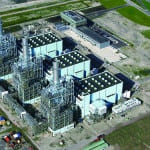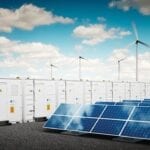Power systems around the world are changing. Renewable energy, mainly in the form of wind and solar generation, is being added everywhere, while more traditional forms of power, such as coal-fired and nuclear generation, are being retired from the grid. Meanwhile, natural gas-fired generation has taken the lead role in facilitating the transition by providing relatively quick ramping capability and stable baseload power to backup intermittent renewables.
However, there is a lot of research and development work underway that could eventually push natural gas out of the mix. The reason is that gas, like other fossil fuels, releases CO2 and other emissions to the atmosphere, albeit at lower quantities than coal, fuel oil, and diesel on a per-kWh-generated basis. One of the potential supplements or replacements for natural gas could be hydrogen.
The concept of a hydrogen economy is not new. It was first contemplated at least as far back as the 1970s, but the economics associated with producing hydrogen at the time made it impractical. That is changing as countries around the world implement decarbonization goals and the share of renewable energy in the power mix increases. Going forward, there are likely to be situations in which the supply of solar and wind power is high, but demand for the electricity is low. Rather than curtailing production, the surplus energy could be used to produce “green hydrogen” through electrolysis.
“There’s no CO2 emissions associated with [green hydrogen],” Megan Reusser, hydrogen development lead at Burns & McDonnell, said as a guest on The POWER Podcast. “So, bringing hydrogen to the forefront as a potential way to meet decarbonization goals, coupled with other types of renewable energy such as solar or wind, that’s what’s really giving [hydrogen] kind of a new life and a really big interest currently in the market.”
Seeing the writing on the wall, the major gas turbine original equipment manufacturers (OEMs) have jumped aboard the hydrogen bandwagon. Siemens, GE, and Mitsubishi Power all have programs underway to make their combustion turbines 100% hydrogen capable. Their intentions are really designed to “future proof” investments in new power plants.
“All the major OEMs have advanced-class gas turbines that are available and can blend up to 30% hydrogen. Where it gets interesting is you see and hear about the concept of hydrogen-ready for the future, and 100% hydrogen capable for the future,” Joey Mashek, business development manager at Burns & McDonnell, said on the podcast. “The plan to develop those technologies to get near 100%, or 100%, is still about 10 years. And I think all the OEMs will say they can do that and will do that, but it’ll be market driven.”
Mashek said there are two projects that are expected to be in commercial operation by 2025 that will blend 30% hydrogen with natural gas and combust it in advanced-class gas turbines. However, when going above 30% hydrogen, controlling NOx becomes more difficult, requiring more sophisticated burners, fine tuning of the combustion process, a selective catalytic reduction system, or some combination of the solutions. “[It] will be interesting to see how that plays out in the development cycle from the OEMs,” Mashek said.
Reusser said Burns & McDonnell has seen a lot of interest in hydrogen pilot projects. “By that I mean small-scale applications where people are just trying to understand how all this is going to come together,” she said.
One example that she mentioned was a system installed by the Orlando Utilities Commission. “They are developing a pilot facility that has a little bit of everything. It’s got [an] electrolyzer, some storage, and a fuel cell. So, they’re kind of doing the whole spectrum of generating their hydrogen, storing their hydrogen, and then converting it back to power,” said Reusser.
“Only thing I can say is, it’s exciting, really exciting time in the energy industry,” Mashek said.
To hear more from the conversation, and how Reusser and Mashek think transportation issues, regulations, and policies, among other things, could affect the use of hydrogen in the future, listen to the full interview on The POWER Podcast. Follow the links below to subscribe via your favorite platform or click on the SoundCloud player to listen now:
For more power podcasts, visit The POWER Podcast archives.
—Aaron Larson is POWER’s executive editor (@AaronL_Power, @POWERmagazine).










